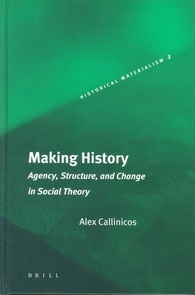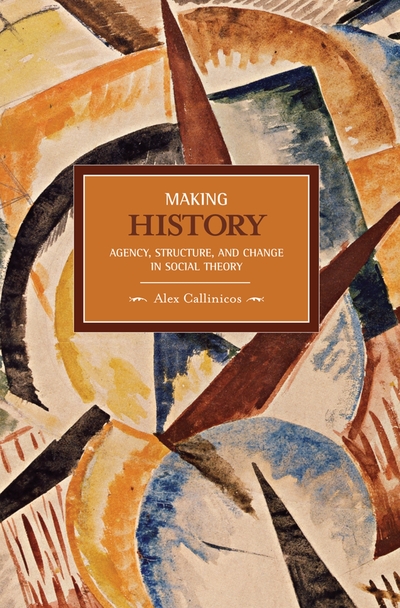Alex Callinicos, Kings College London
Making History is about the question – central to social theory – of how human agents draw their powers from the social structures they are involved in. Drawing on classical Marxism, analytical philosophy, and a wide range of historical writing, Alex Callinicos seeks to avoid two unacceptable extremes – dissolving the subject into an impersonal flux, as poststructuralists tend to – and treating social structures as the mere effects of individual action (for example, rational-choice theory). Among those discussed are Althusser, Anderson, Benjamin, Brenner, Cohen, Elster, Foucault, Giddens, Habermas, and Mann. Callinicos has written an extended introduction to this new edition that reviews developments since Making History was first published in 1987. This republication gives a new generation of readers access to an important intervention in Marxism and social theory.
Biographical note
Alex Callinicos, D.Phil. (1979) in Philosoph, University of Oxford, is Professor of Politics at the University of York (UK). He has written widely about Marxism and social theory. His most recent books are Social Theory (1999), Equality (2000), Against the Third Way (2001), and An Anti-Capitalist Manifesto (2003), all published by Polity.
Readership
For all those interested in social theory, philosophy, historical materialism, and Marxism.
Table of contents
Preface
Introduction to the Second Edition
Introduction
Chapter 1 Subjects and Agents
1.1. There concepts of agency
1.2. The orthodox conception of agents
1.3. Human nature: the need for a philosophical anthropology
1.4. Human nature: morality, justice and virtue.
1.5. Practical reason and social structures
Chapter 2 Structure and Action
2.1. The concept of social structure
2.2. The basic concepts of historical materialism
2.3. Orthodox historical materialism
2.4. Rational-choice Marxism
2.5. Structural capacities and human action
2.6. What’s left of historical materialism?
Chapter 3 Reasons and Interests
3.1. Expressivism and the hermeneutic tradition
3.2. Interpretation and social theory
3.3. Charity, truth and community
3.4. The Utilitarian theory of action
3.5. Interests and powers
Chapter 4 Ideology and Power
4.1. Collective agents
4.2. Falsehood and ideology, I
4.3. Falsehood and ideology, II
4.4. Nation, state and military power
4.5. A note on base and superstructure
Chapter 5 Tradition and Revolution
5.1. Revolution as redemption: Benjamin and Sartre
5.2. Marxism and the proletariat
5.3. The rationality of revolution
5.4. Revolution and repetition
5.5. The tradition of the oppressed
Conclusion
Index


